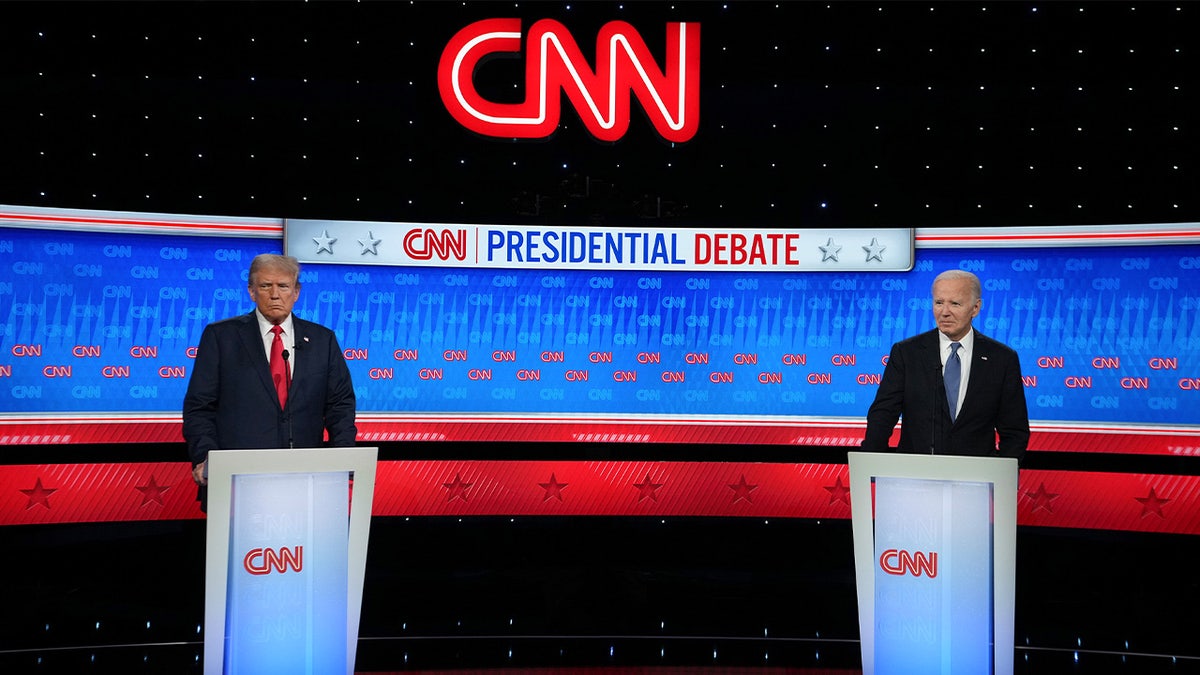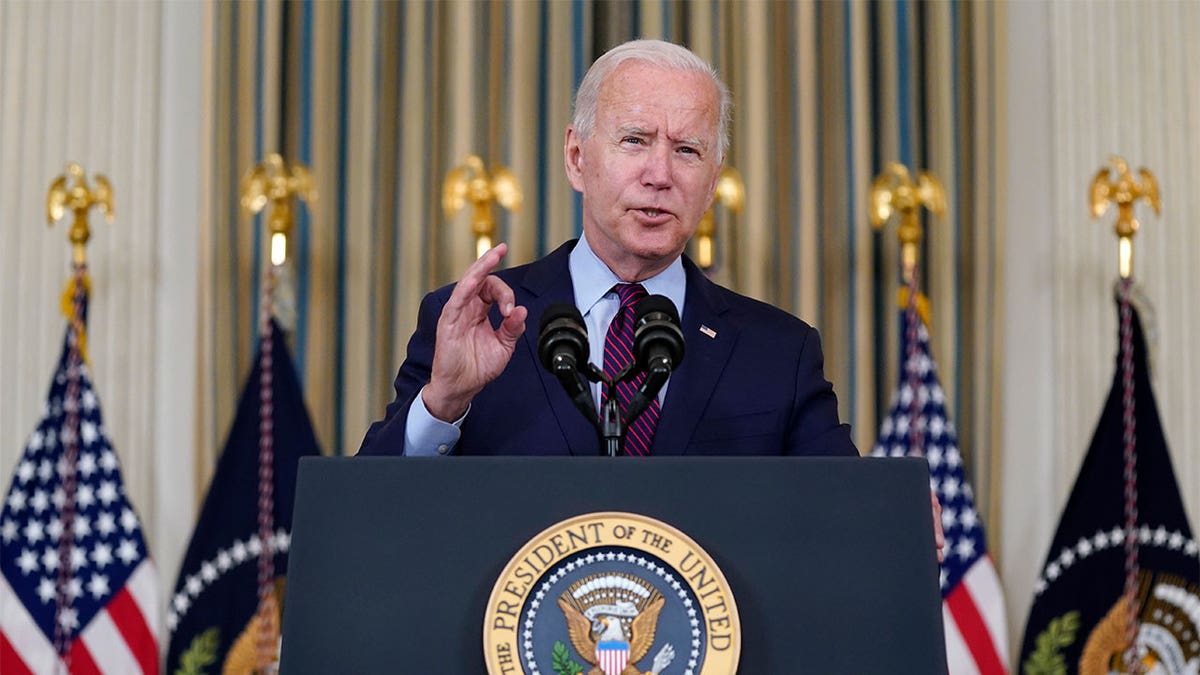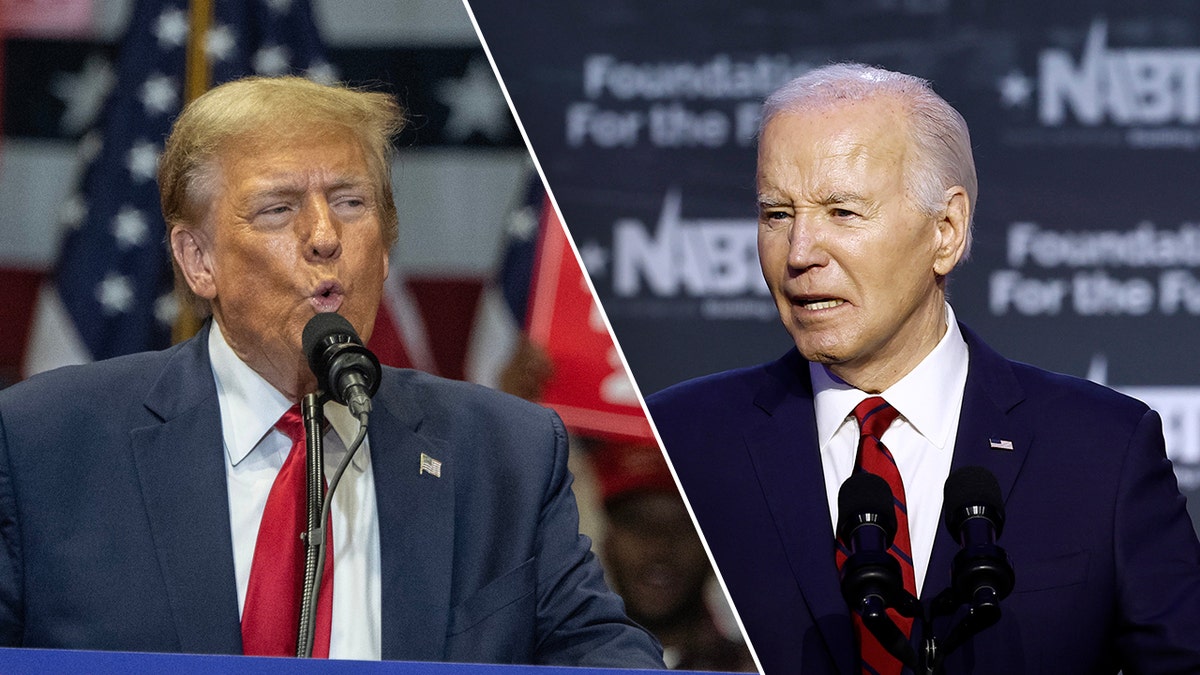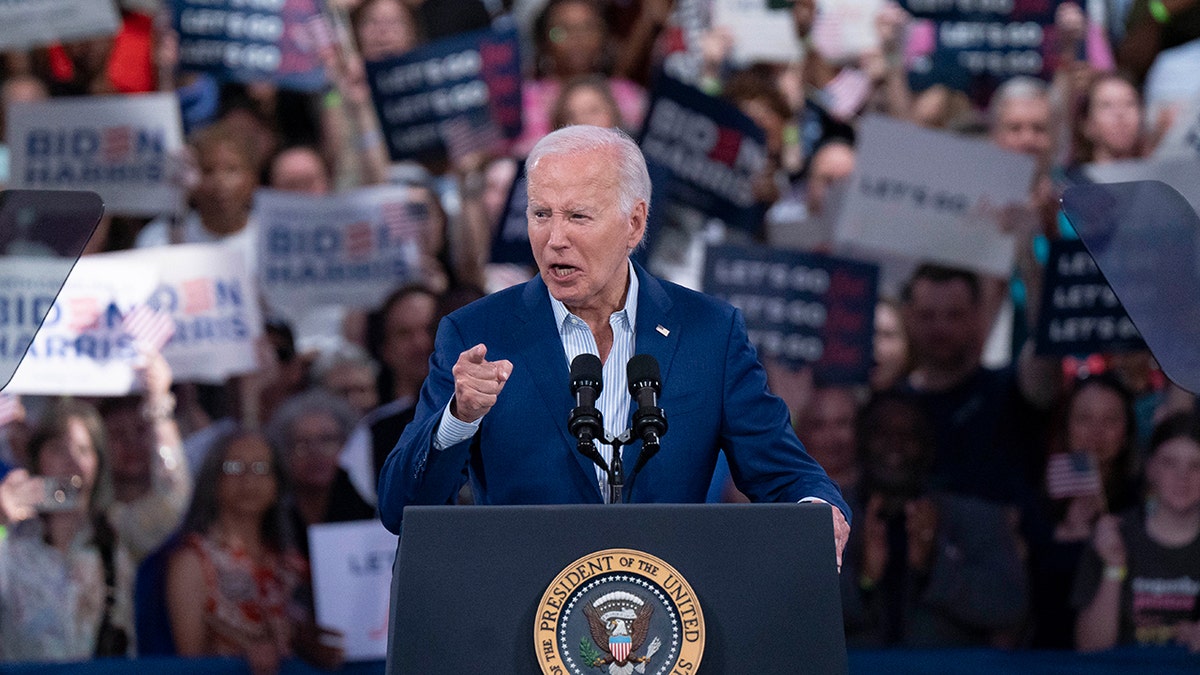Biden's debate performance was '90 mins of unmitigated disaster': Kim Strassel
'Sunday Night in America' panelists Kim Strassel and Jose Arisitimuno discuss the criticism of President Biden's CNN Presidential Debate performance.
Debates are a unique forum in modern politics.
They test a candidate’s knowledge and character. They are seen by tens of millions of viewers. And they cannot be stage-managed by a campaign.
Voters saw all those dynamics at play last Thursday night.

Flash polls from other news outlets show voters, by and large, believe former President Trump won Thursday night's debate against President Biden. (Andrew Harnik/Getty Images)
President Biden was, at times, incoherent.
He spoke in a fatigued, raspy voice, which sources attributed to a cold nearly an hour into the debate.
And he regularly looked stiff or bewildered during his opponent’s answers.
Political analysts and some of the president’s allies said Biden had the "worst debate performance in modern political history."
Others have called for him to step aside (there is no reporting that he will, and that is the only way for him not to become the Democratic nominee).
Flash polls from CNN and Ipsos on Friday called Trump the clear victor of the showdown.
CNN FLASH POLL SHOWS TRUMP AS CLEAR WINNER OF FIRST PRESIDENTIAL DEBATE: 'STUNNING NUMBER'
But it will take longer to assess whether Americans have changed their mind about their vote.
Voters need to hear about and digest the debate, then decide whether it affects their choice. It then takes days for a survey to reach a representative sample of the population. You also want to see multiple reliable polls to adjust for outliers.
A good rule of thumb is to wait two weeks.

It's too early to properly gauge how much of an impact President Biden's underwhelming debate performance had on prospective voters' decisions. (AP Photo/Evan Vucci)
That is what the Power Rankings forecast will do. Expect an update to the presidential rankings and the first congressional rankings later this month.
In the meantime, pre-debate surveys offer clues on how the debate might change the race.
Clue #1: Debates can have a meaningful effect on the race
The American electorate is partisan and polarized.
In the last presidential election, 95% of voters said they leaned or considered themselves a Democrat (47%) or Republican (48%). Separately, 37% described their vote as more against their candidate’s opponent than for their own.
It was also a very close election. Biden won the three most competitive states by an average of just 14,306 votes.
BIDEN WELCOMES BERNIE SANDERS RALLIES BOOSTING WORKERS IN SWING STATE AS TRUMP COURTS WORKING CLASS
This makes even small shifts in polling significant.
The last time these two candidates met was in October 2020, when they argued about the country’s path out of the coronavirus pandemic and landed blows over their records and character.
Then-President Trump gained about a point in polling averages.

Then-President Trump gained roughly a point in polling averages following the last skirmish between himself and then-former Vice President Biden in 2020. (JIM WATSON/AFP via Getty Images)
Weeks earlier, at the first debate, a combative Trump consistently interrupted his opponent and the moderator, relied on insults and downplayed the pandemic days before going to hospital with the virus that caused it.
Trump lost two points in polling averages, and that may have been the drop that cost him the election.
Biden's performance at last week's debate was dismal enough that it could cause as much of a drop, and maybe a bigger one.
A RASPY BIDEN DELIVERS A HALTING DEBATE PERFORMANCE IN SHOWDOWN WITH TRUMP
It does not change the values or policies of his administration, which is what partisans are voting on.
There are still 127 days until the election, each one offering opportunities to reset, or seize on an opponent’s weaknesses, in an already unprecedented cycle.
But given Biden’s existing weakness in battleground state polls, even a one-to-two-point drop would be unhelpful.
Clue #2: The debate could hurt Biden, but may not help Trump
When people talk about polls, they usually take the difference between the percentage of voters supporting each candidate to show which candidate is leading the race.
For example, in the latest Fox poll, 50% of registered voters prefer Biden and 48% prefer Trump, so people say Biden is "leading" Trump by two points.
Looking at the percentage of voters supporting each candidate individually, however, can give us more insight into the race.
BIDEN VOWS TO KEEP WHITE HOUSE, UNDETERRED BY DEMOCRATIC PANIC AFTER DEBATE DISASTER
In Fox News polls since September, Biden gets an average of 47% and his results range from 45-50%.
Trump gets an average of 49% and a range of 48-50%.
Trump’s level of support is strong and consistent, even as he navigated a contentious Republican primary and, in May, became the first former American president to be convicted of a felony.

Former President Trump's support has remained consistent, despite his 34 felony convictions in Manhattan. (Felipe Ramales for Fox News Digital)
Biden’s support is weaker, and it fluctuates. He captures the Democratic base and most voters who lean towards the party; 89% of those voters have a "strongly unfavorable" view of Trump.
There is weakness in his share of Black, Hispanic and young voters compared to the 2020 election, and his numbers bounce around with independents.
These results suggest that Biden’s poor debate performance could hurt his top line level of support. Perhaps he drops precipitously with independents, or the share of Democrats saying they support "someone else" this year increases.
CAN BIDEN BE REPLACED AS THE DEMOCRATIC NOMINEE?
Trump’s consistency suggests that there is a ceiling on his level of support.
The ceiling is high enough that, absent any change in his opponent’s national and battleground state polling, he can win this race.
But it is possible that Biden’s debate disaster does little to push voters to Trump.

It's entirely possible that the debate will have little effect on either candidate's bottom line in the polls. (Left: Victor J. Blue/Bloomberg via Getty Images, Right: Anna Moneymaker/Getty Images)
Clue #3: Most voters say age is important to their vote, but fewer in a group essential to Biden
In Fox News' June survey, 72% of voters said age and mental soundness were "extremely" or "very" important to their vote.
The results were similar across most voter groups that could decide the outcome of this election:
Voters who say age and mental soundness extremely or very important to vote:
- 73% White
- 62% Black
- 77% Hispanic
- 73% Age under 30
- 67% Age 65+
- 75% Independent
- 62% Liberal
- 66% Moderate
- 70% College degree
- 74% No college degree
- 75% Suburban
Fox News Poll, June 14-17, 2024; MOE: White ±3.5, Black ±9, Hispanic ±8, Age Under 30 ±8, Age 65+ ±5.5, Independent ±7.5, Liberal ±5, Moderate ±6.5, College Deg ±4.5, No College Deg ±3.5, Suburban ±4.5
Black voters are among the least likely to say age is important, with 62% of that group agreeing versus 72% of voters overall. That is a 10-point gap.
That is within the 9-point margin of sampling error in the poll for this subgroup.
But there have been gaps like this in several recent polls:
- 63% of Black voters said "too old" described Biden very or somewhat well versus 79% of all voters, a 16 point gap (Marquette).
- 62% of Black voters strongly or somewhat agreed that Biden was "too old" versus 69% of all voters, a 7 point gap (Siena).
That is somewhat welcome news for Biden.
TRUMP’S SURGE IN POLLS WITH BLACK VOTERS STUNS CNN ANALYST: ‘TRULY HISTORIC’
In the Fox pre-debate poll, the president was down 18 points with Black voters compared to the 2020 election, and again, given Biden’s small margin of victory, a drop that high carried through to November would be catastrophic for him.
These results suggest that Black voters, more of whom lean toward Biden, are also more tolerant of his age.
To be clear, Biden is already seeing significant erosion with Black voters. He needs to make gains with this bloc, not just stay steady or decline by a few points.
The polling merely hints that he might not lose out as much with these voters as he does with others.

Concerns over President Biden's age and mental acuity vary across different voting blocs. (Allison Joyce/Getty Images)
Clue #4: Arizona and Nevada the most likely states to shift toward Trump
Generally speaking, there isn’t a significant variation among voter groups on the importance of age to their vote.
And that means a reduction in Biden’s overall support in post-debate polls will probably affect his position in the battleground states uniformly.
The pre-debate Fox News Power Rankings have four states as toss-ups: Arizona, Nevada, Pennsylvania and Wisconsin.
HOW PRESIDENTIAL BATTLEGROUND STATES HAVE CHANGED OVER THE YEARS
According to state polls, Biden is weaker in the two Sun Belt states than the two Rust Belt states.
Therefore, Arizona and Nevada would be the most likely states to shift towards Trump, followed by Pennsylvania and Wisconsin.
There are also two states ranked as leaning Democratic: Michigan and Minnesota.
These may become more competitive depending on whether Biden loses support over the next few weeks.

Top battleground states this year include Wisconsin (pictured), Pennsylvania, Arizona and Nevada, with the latter two currently deemed most likely to flip into the Republican column. (AP Photo/Kenny Yoo, File)
Clue #5: Down-ballot Democrats outperform Biden, but there are limits to how much they can help themselves
Americans will also decide the outcome of a raft of Senate, House and Governor races in November.
Voters have already indicated that they like Democratic Senate candidates more than President Biden in polls:
- Arizona: Trump leads Biden by 6 points, 50-44%, but the Democratic Senate candidate leads the GOP candidate by 3 points, 48-45% (AARP).
- Ohio: Trump leads Biden by 7 points, 48-41%, but the Democratic Senate candidate tops the GOP candidate by 5 points, 50-45% (Marist).
- Pennsylvania: Trump tops Biden by 2 points, 47-45%, but the Democratic Senate candidate bests the GOP candidate by 6 points, 52-46% (Marist).
Biden’s debate performance could further increase the gap between his support and that of Democratic Senate candidates.
POPULAR REPUBLICAN AND TRUMP RUNNING MATE CONTENDER MAKES FIRST SENATE ENDORSEMENT IN 2024 RACES
Moreover, Democrats have two incumbent senators, Jon Tester in Montana and Sherrod Brown in Ohio, who have developed their own political brand.
But there is only so much lift that any of these candidates can provide both to their own campaign and to Biden.
After all, President Biden is the most visible Democrat in the country, and all these candidates will appear on the ballot with a D next to their name.

A poor performance by President Biden could have dire down-ballot effects for Senate Democrats; most vulnerable are Sens. Jon Tester of Montana, Jacky Rosen of Nevada, Sherrod Brown of Ohio, Tammy Baldwin of Wisconsin and Bob Casey of Pennsylvania. (Getty Images: Anna Moneymaker, Drew Angerer, Ethan Miller, Sarah Silbiger)
The weeks ahead
The president has been talking with advisers since Thursday.
He is meeting with family for a second day at Camp David Monday.
He reportedly discussed the future of his campaign, though White House officials suggest the trip had been planned since before the debate.
CLICK HERE TO GET THE FOX NEWS APP
America heads into July Fourth this week.
It will take another week after that to properly assess the impact of Biden’s debate performance.
At that point, the Power Rankings forecast will return.















































